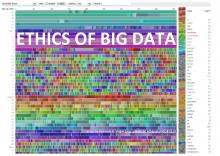
David Renton (Barrister, Garden Court Chambers)
What are the implications for relations between employers and workers of living in a society where passive and active forms of data collection, near-ubiquitous connectivity and proliferating use of digital devices create highly detailed personal ‘data footprints’ combining everything from location data to shopping habits, political opinions and religious beliefs? Recent high-profile court cases have highlighted the ‘blacklisting’ of trade union activists by major construction companies, based the illegal collection of data about their presumed political opinions and personal lives. In an era when billions of people use social media to share information about themselves and their beliefs online, what considerations will shape future battles over the balance between rights to privacy and freedom of expression in the context of employment relations?
David Renton specialises in employment law and has worked a number of high-profile cases relating to blacklisting of trade union activists by employers. Before being called to the bar, David was an academic and then a trade union official specialising in discrimination law.
Open to all but Registration is required, further information will be available soon.
Organised by Ethics of Big Data Research Group in collaboration with The Work Foundation and InformAll.
Part of the Ethics of Big Data Research Group, series
Administrative assistance: gradfac@crassh.cam.ac.uk
Image: Fernanda B. Viégas (User activity on Wikipedia) [CC BY 2.0]
